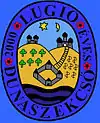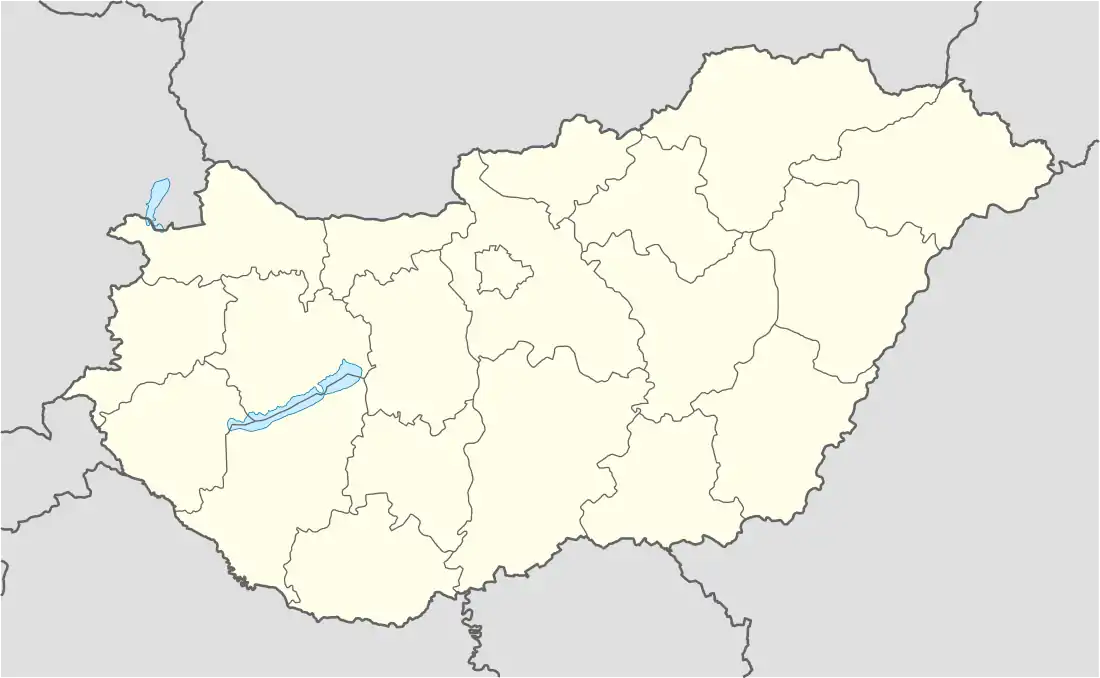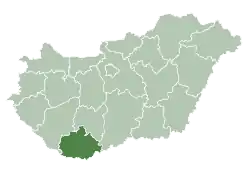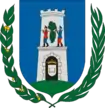Dunaszekcső
Dunaszekcső (Serbo-Croatian: Sečuv, Sečuj, Sečuh) is a village in Baranya County, Hungary, situated on the right bank (west side) of the River Danube. The inhabitants are ethnic Hungarian, with minorities of Serbs and Danube Swabians. The population was about 1900 in 2015.
Dunaszekcső
Florentina / Lugio (in Latin) Sečuv / Sečuj / Sečuh (in Serbo-Croatian) | |
|---|---|
 Coat of arms | |
 Dunaszekcső Location of Dunaszekcső in Hungary | |
| Coordinates: 46°4′54.12″N 18°45′31.25″E | |
| Country | Hungary |
| Region | Southern Transdanubia |
| County | Baranya |
| Subregion | Mohácsi |
| Rank | Village |
| Area | |
| • Total | 36.76 km2 (14.19 sq mi) |
| Population (2015)[2] | |
| • Total | 1,911 |
| • Density | 52/km2 (130/sq mi) |
| Time zone | UTC+1 (CET) |
| • Summer (DST) | UTC+2 (CEST) |
| Postal code | 7712 |
| Area code | +36 69 |
| Website | www.dunaszekcso.hu |
History
The present village largely covers the site of the substantial Roman camp and settlement of Lugio.[3]
In June 1700, Serbian Patriarch (in exile) Arsenije III held a church assembly in the town, which was known in Serbian as Sečuj.[4] Sečuj at that time was one of the centers of Serbian church and political life.[4] At the assembly, Danilo Šćepčević was officially chosen as the metropolitan of Montenegro (Cetinje).[4]
Amenities
The village has an eight-grade primary school, a kindergarten, a cultural center, a library and an old people's day-care center. Medical services are provided by two physicians, a nurse, and a dentist.[5]
The village lies on the main road No. 56. It has regular long-distance and local bus services.[5]
The Dunaszekcső Loess Slope is a nature protection area forming part of the Danube–Drava National Park.[6]
References
- Dunaszekcső at the Hungarian Central Statistical Office (Hungarian).
- Dunaszekcső at the Hungarian Central Statistical Office (Hungarian). 2015
- History (in Hungarian) Retrieved 22 January 2017.
- Гласник Историског друштва у Новом Саду. Друштво. 1935.
Још 1700 био је Сечуј неко средиште српског црквено-поли- тичког живота. Месеца јуна те године одржао је патријарх Арсе- није III сабор у Сечују, на којем је дао синћелију новом владики Црне Горе Данилу. На том сабору су ...
- Village website (in Hungarian): Retrieved 22 January 2017.
- Village site (in Hungarian): Retrieved 22 January 2017.
External links
- Dunaszekcső's web site
- Dunaszekcső link
- Dunaszekcső from an airplane
- Dunaszekcső's new library's web site

